No matter how much you prepare yourself to be a foster parent (or parent in general), you will never be fully prepared. Being a foster parent throws some additional curveballs in the preparation process for becoming a parent, and honestly, with each placement the only thing that gets easier is that you are more prepared to be unprepared. As many of you probably know, during our certification process we anticipated being foster parents to school-age children, but our first placement was Ava*, an infant, who arrived at our home 4-hours after the initial placement phone call.
When becoming a parent, you often have 9ish-months to prepare. You can use this time to freak out, paint the bedroom, clean the house, stock-up on necessary and unnecessary supplies, over-analyze, host a baby-shower, spread out expenses over months, and yes, freak out. To become a foster parent, it took us a little bit less than 6-months from the start of our journey to our first placement. During that time, we prepared our home to pass the DHS Home Inspection (fire extinguisher = check!), and emptied the room that our future kiddo would occupy, save for a twin bed. Beyond that, we had no idea if we should get toys, clothes, and decorations for a 5-year old boy, or an 18-year old girl, or anyone in between. And it turns out, we should have ditched the bed, set-up a crib, and prepared for an 11-month old little girl!
All we are trying to say is, “preparing for a placement is very difficult”. Our first placement was just as difficult as preparing for our 5th and 6th. These are little humans, all with their own needs, and the amount of time you have between when you know they are coming, and when they arrive can be measured in minutes or hours, not months. Many of the items you purchase for your kiddos need to be and should be sent with them when reunification occurs (clothes, toys you bought them, hygiene products, etc.), but some things you buy, are considered items for the house, and you can keep for the next placement. This phenomenon explains why we have a double jogger and single jogger as well as a pack-n-play taking up valuable storage space while there are no toddlers currently in our home. Continue reading “Foster Care Wishlist”











